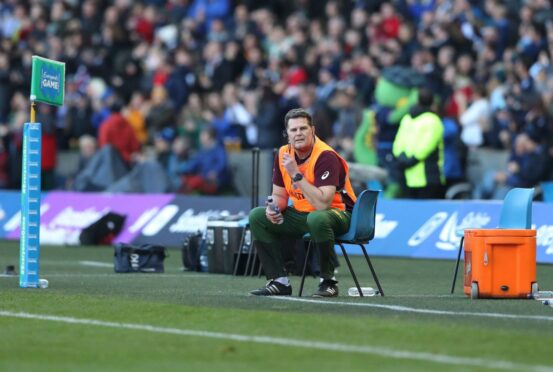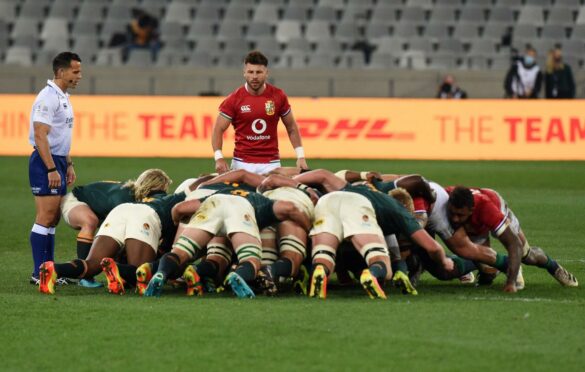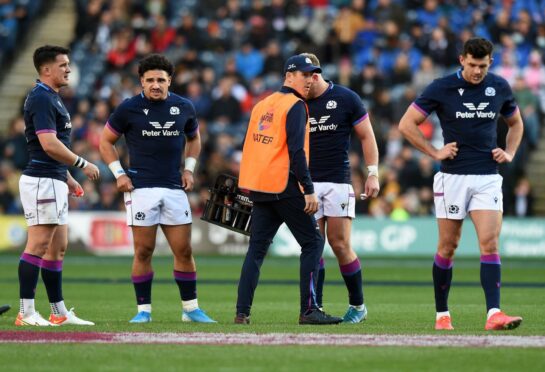It seems that the South African Union have finally backed down on the disciplinary penalties imposed of Springbok director of rugby for his unprecedented attack on Australian ref Nic Berry.
The South Africans have now apologised and Erasmus accepted the two-month ban from all rugby and the touchline ban for a year.
Erasmus did tease his slavish followers – some of those in support of him on Twitter in the last few months have been beyond ludicrous in their various conspiracies. A documentary’s coming, he revealed, “telling his side of the story”. As if the infamous one-hour video didn’t do that already.
But the whole affair is now closed. Hopefully.
Normalising distrust of referees
One of the most disquieting elements of it all was just how much some of the Springbok media went fore square behind Erasmus and his ridiculous allegations.
I zoomed in on four Springbok interview sessions when they were in Scotland last month. At every one a South African journalist asked some question about the ref. Whether he had been good to the Springboks in the past, or whether there might be “issues” with him.
It now seems for them, openly questioning the ref – even before he’s blown the whistle to start a game – has been normalised.
I’m not that big on #rugbyvalues; the sport can be unbearably superior and pro-faced about itself. Neither do I agree with the old adage of the late Bill Hogg, once secretary of the SRU – `the referee is always right, and never more so than when he is wrong’.
Interpretation of the laws is central to rugby
Gregor Townsend: Erasmus ban is justice and South African coach was sledging Scots on the sidelines
Scotland in my 30 years covering them have had plenty of run-ins with officials. You need only remember the name Craig Joubert, for example.
But there remained an understanding – as much the respect thing – that rugby is a uniquely complicated game. ‘Interpretation’ of the rules (laws if you must) is inconvenient to some but seems to me to be essential to our game’s culture.
To openly suggest referees are biased and/or incompetent when they are clearly making judgements normal to them is a very dangerous route to take.
Other sports are comfortable criticising officials. That’s fine, within that’s their culture, and sits fine within their games.
I would never say that one sport’s culture is superior to another’s. None are a mirror to society and they are all quite different. I happen to think that’s a good thing.
But even if some of us cringe when we hear ‘this is not soccer’, rugby’s attitude to officials is central to its culture. The attitude of some South Africans for the past few months risks permanently damaging that.
Sideline presence is fine – as long as it’s to your team only
Physio? Water carrier? Cheer leader? pic.twitter.com/HBug13xXrD
— John Barclay (@johnbarc86) November 20, 2021
The other aspect of Erasmus’ ban is that his “water carrying” duties have been curtailed for a year. The South African director of rugby has customarily been pitchside with an H20 bib on, but clearly for the primary purpose of relaying instructions and coaching.
Gregor Townsend took offence at some comments Erasmus made from the touchline during the Murrayfield tests. The Scotland head coach suggested Erasmus was sledging and acting as a cheerleader. Townsend said he wants sideline coaching banned.
We’ve seen plenty examples of coaches-as-water-carriers causing friction in recent times.
New Zealand captain Sam Whitelock asked the referee in their Dublin test to remove Irish assistant coach John Fogarty. Wayne Barnes send a water-carrier/physio to the stands in a recent Premiership game for getting too involved.
Everybody’s doing it…
Even Scotland under Townsend have had assistant coaches with headsets carrying on water and kicking tees. Mike Blair did it until this summer, and new skills coach AB Zondagh had the headset on at pitchside during the autumn tests.
Richard Cockerill, late of Edinburgh, is now an assistant to Eddie Jones at England and was relaying messages and coaching during their autumn tests. Everybody’s doing it.
Not to overload them under so much scrutiny of late, I’d leave this one with the refs. Relaying information and coaching advice is surely fine, it happens in just about every other sport.
In the NFL, for goodness sake, coaches even have a radio headset connected to the quarterback’s helmet (it cuts out 30 seconds before a play starts).
So leave the guys with the headsets under the current limits (only four watercarriers allowed) – for THEIR guys. Any interaction of any sort with the opposition should result in an automatic trip to the stands. Quite simple, actually.
The URC’s Covid struggles continue
#MunsterInSA 🇿🇦
A group of 34 #MunsterRugby players & staff departed Cape Town tonight having received negative results after completing a 4th round of PCR testing in six days.
Read a full travel update ⤵️https://t.co/skwVyujmGW#URC #SUAF 🔴 pic.twitter.com/Ovc2KysKZW
— Munster Rugby (@Munsterrugby) November 30, 2021
Not simple is the mess the United Rugby Championship has found itself in. Munster, Cardiff and the Scarlets all found themselves corralled in South Africa when the Omicron variant arrived last week.
It seems all three teams left some of their more established test players behind. But it’s a supremely concerning situation for the players, coaches and officials who were stranded and who have to quarantine once the complicated process is complete to allow them to return.
The South Africans will fill the space without visitors playing games against each other – just as they did when the Rainbow Cup was affected by Covid variants. There might be a pattern developing here.
This isn’t likely to be the last disruption. The URC was a bold attempt to make a cross-border league into something special. We seem to have an environment at the moment that makes it simply unviable.


